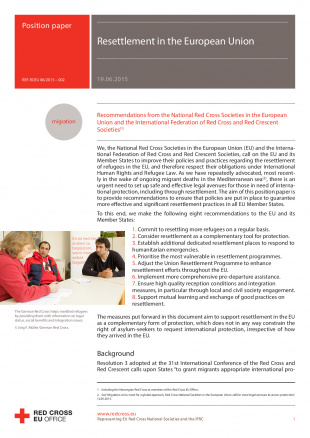Resettlement in the EU: a fresh start for vulnerable refugees
Ahead of World Refugee Day, National Red Cross Societies in the EU and the International Federation of Red Cross and Red Crescent Societies are calling on Member States to step up their resettlement programmes. Our position paper on Resettlement in the European Union puts forward the following set of recommendations to improve resettlement trends, programming and practices across the EU:
- Commit to resettling more refugees on a regular basis.
- Consider resettlement as a complementary tool for protection.
- Establish additional dedicated resettlement places to respond to emergency humanitarian situations.
- Prioritise the most vulnerable in resettlement programmes.
- Adjust the Union Resettlement Programme to enhance resettlement efforts throughout the EU.
- Implement more comprehensive pre-departure assistance.
- Ensure high quality reception conditions and integration measures, in particular through local and civil society engagement.
- Support mutual learning and exchange of good practices on resettlement.
This paper, builds on previous position papers on Legal Avenues to Access International Protection in the EU (February 2013) and Access to international protection in the EU for people fleeing Syria (October 2014), which are based on the practical experiences of Red Cross National Societies working directly with and for vulnerable migrants in the EU.
On 8 June 2015, the European Commission presented its recommendation, which called on EU Member States to jointly provide a minimum of 20,000 resettlement places in the next two years. We welcome this positive step forward. It must however be followed by concrete measures which are forward-looking and firmly based on the principles of humanity, solidarity and respect for human rights. "Resettlement should be considered as a complementary form of protection for vulnerable people in an intractable situation”, says Leon Prop, Director of the Red Cross EU Office. "But it must in no way constrain the right of asylum-seekers to request international protection, irrespective of the manner in which they entered the EU”, he adds.
Once in the host country, some resettled refugees experience difficulties to adjust to their new environment. They can feel isolated by cultural and language differences, and often carry trauma from their previous experiences. However, we believe that if they are empowered and given the means to thrive, resettled refugees can become significant contributors to European society. We therefore urge Member States to work hand in hand with all stakeholders and local communities to implement successful resettlement programmes that facilitate the integration and recognise the added value of resettled refugees. We all need to work together to make resettlement a true durable solution for refugees.


